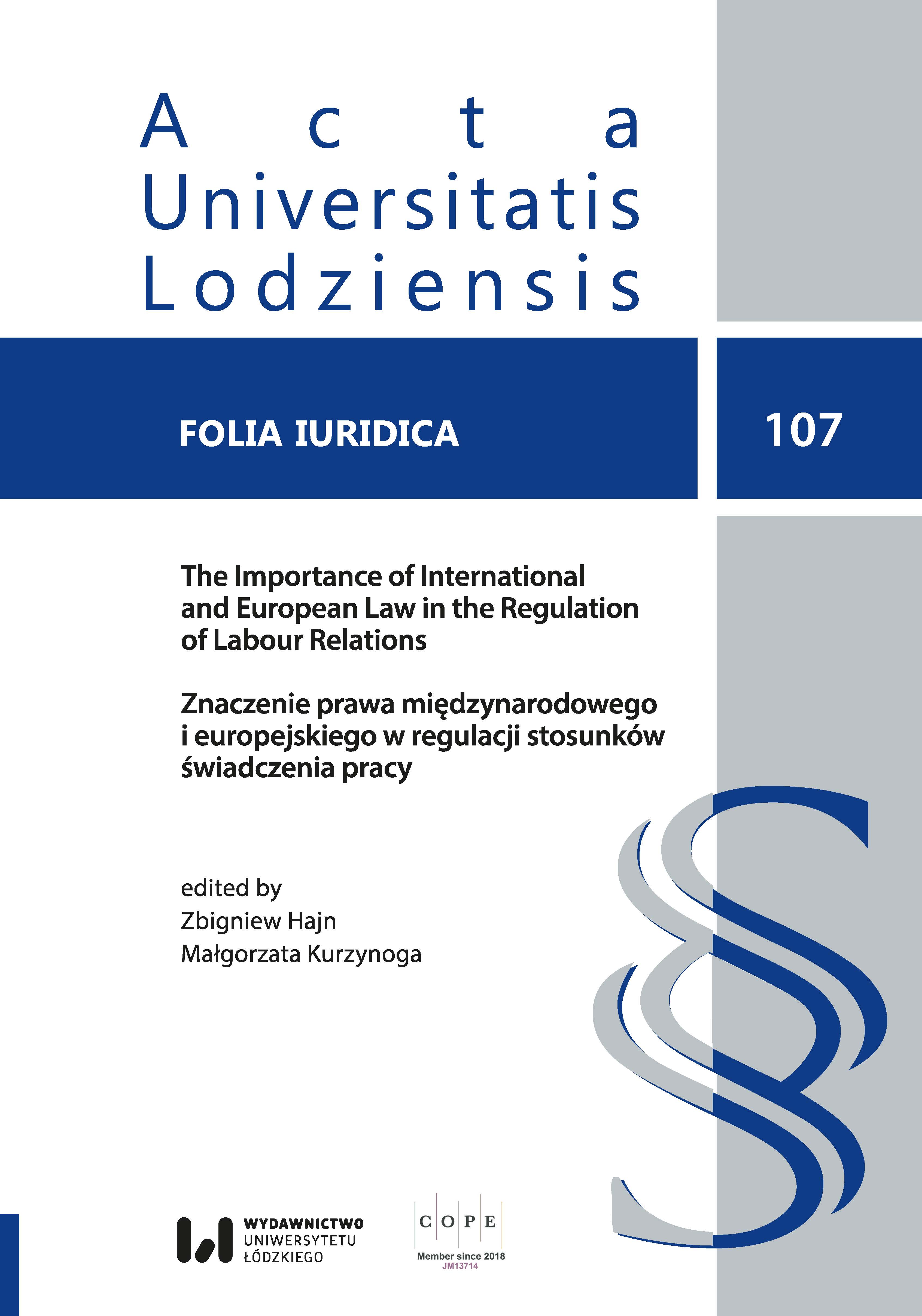The Right to Disconnect: Rest in the Digital Age of Work from the International, European and Polish Law Perspectives
DOI:
https://doi.org/10.18778/0208-6069.107.06Keywords:
the right to disconnect, rest, remote workingAbstract
The aim of this article is to justify the thesis that the right to be offline (the right to disconnect from digital tools) is not a redundant term. It is an original and autonomous right, distinct from the general right to rest. It is a right that arises in the new world of work, shaped by constant electronic and digital connectivity, designed with other needs in mind and exemplifying the increased legal protection required for rest and family time in the modern digital age.
Downloads
References
Borges, Isabel. 2023. “R2D: The Right to Disconnect from Work.” In The Legal Challenges of the Fourth Industrial Revolution. Ed. by Dário Moura Vicente, Sofia de Vasconcelos Casimiro, Chen Chen. Cham: Springer.
Google Scholar
DOI: https://doi.org/10.1007/978-3-031-40516-7_14
Eurofound. 2020a. “COVID-19 Unleashed the Potential For Telework – How Are Workers Coping?” Eurofound: Dublin.
Google Scholar
Eurofound. 2020b. “The Right to Disconnect in the 27 EU Member States.” Eurofound: Dublin.
Google Scholar
European Parliament. 2020. “The Right to Disconnect.” https://www.europarl.europa.eu/RegData/etudes/BRIE/2020/642847/EPRS_BRI(202)642847_EN.pdf (Accessed: 5.02.2024).
Google Scholar
International Labour Organisation. 2021. “Healthy and safe telework. Technical brief.” Geneva: ILO.
Google Scholar
Kurzynoga, Małgorzata. 2022a. “Propozycje Parlamentu Europejskiego unormowania prawa ‘do odłączenia’ (right to disconnect) – potrzeba dla pracowników oraz dodatkowe obowiązki dla pracodawców.” Praca i Zabezpieczenie Społeczne 5: 3–13.
Google Scholar
DOI: https://doi.org/10.33226/0032-6186.2022.5.1
Kurzynoga, Małgorzata. 2022b. “Prawo ‘do odłączenia’ jako nowa instytucja realizująca prawo do odpoczynku.” In Między ideowością a pragmatyzmem – tworzenie, wykładnia i stosowanie prawa. Księga jubileuszowa dedykowana Profesor Małgorzacie Gersdorf. Ed. by Krzysztof Rączka, Barbara Katarzyna Godlewska-Bujok, Eliza Maniewska, Wojciech Ostaszewski, Michał. Raczkowski, Aleksandra Ziętek-Capiga. Warszawa: Wolters Kluwer.
Google Scholar
Moras-Olaś, Kinga. 2021. “Prawo do bycia offline jako podstawowe prawo pracownika.” Studia z Zakresu Prawa Pracy i Polityki Społecznej 28(4): 305–323.
Google Scholar
DOI: https://doi.org/10.4467/25444654SPP.21.024.14266
Naumowicz, Kamila. 2021. “Prawo do bycia offline a praca zdalna.” In Praca zdalna w polskim systemie prawnym. Ed. by Małgorzata Mędrala. Warszawa: Wolters Kluwer.
Google Scholar
Raczkowski, Michał. 2020. “Czas pracy.” In Prawo pracy. Pytania i odpowiedzi. Ed. by Małgorzata Gersdorf, Krzysztof Rączka, Eliza Maniewska, Michał Raczkowski. Warszawa: Wolters Kluwer.
Google Scholar
Raport Komisji Zatrudnienia i Spraw Socjalnych PE. 2022. Report on mental health in the digital world of work (Report – A9-0184/2022).
Google Scholar
Seweryn, Renata. 2017. “Technologie informacyjne i komunikacyjne – wprowadzenie w problematykę.” In Technologie informacyjne i komunikacyjne na rynku turystycznym. Ed. by Jadwiga Berbeka, Krzysztof Borodako. Warszawa: C.H. Beck.
Google Scholar
Smolski, Marcin. 2023. “Prawo pracownika do bycia offline. Odpoczynek w czasach digitalizacji pracy.” Inspektor Pracy 9: 11–15.
Google Scholar
Judgment of the Court Judgment of 17.11.2016, C-216/15, Betriebsrat der Ruhrlandklinik gGmbH v Ruhrlandklinik gGmbH, EU:C:2016:883.
Google Scholar
Supreme Court Judgment of 1 August 1990, I PRN 7/90, LEX nr 83845.
Google Scholar
Downloads
Published
Versions
- 2024-08-06 (2)
- 2024-06-30 (1)
How to Cite
Issue
Section
License

This work is licensed under a Creative Commons Attribution-NonCommercial-NoDerivatives 4.0 International License.














